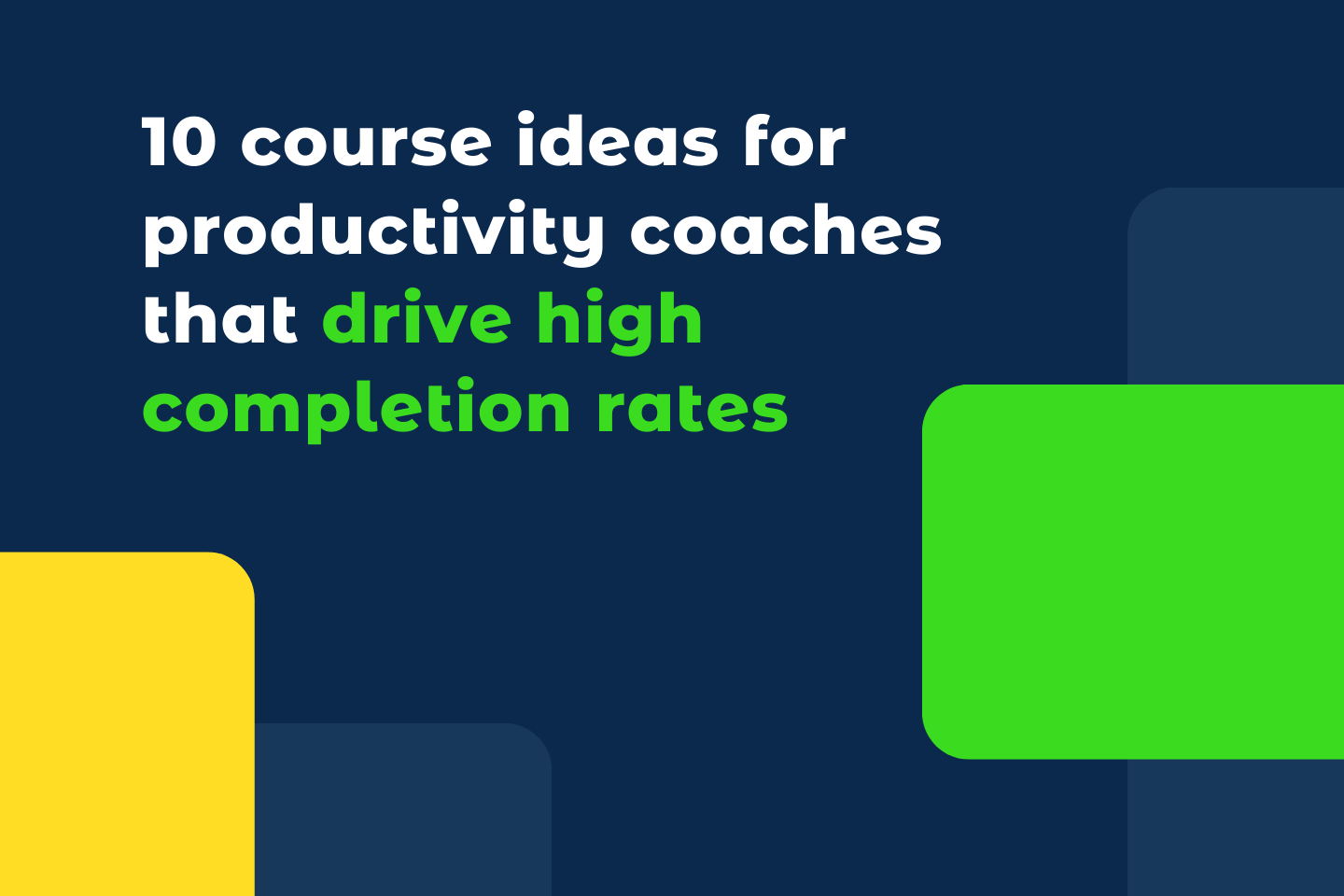As a productivity coach, your ultimate goal is to empower individuals and guide them toward achieving their goals efficiently and effectively. An impactful approach to do this is providing meticulously designed and captivating courses that not only deliver valuable knowledge but also guarantee exceptional completion rates.
In this blog post, we will examine the important role productivity coaches play in coachees’ personal and professional growth and explore a range of course ideas specifically designed for productivity coaches. These course ideas will enable you to create transformative learning experiences that inspire and motivate your clients to see their coaching program through to the end.
The Role of a Productivity Coach
The demand for productivity coaches has never been higher in a world where there are so many distractions and time seems to pass so quickly.
A productivity coach’s primary responsibility is to assist their clients in overcoming procrastination, optimizing their time, and achieving their long-term goals with focus and determination. They serve as guides, providing support and motivation to coaching clients as they enhance their productivity and master the art of effective time management.
Helping their customers define what it is they want to accomplish is a major part of a productivity coach’s job. They implement careful questioning and active listening to assist clients in clarifying their objectives and breaking them down into manageable steps.
Once the goals are established, a productivity coach helps clients create an actionable game plan and prioritize tasks effectively. They teach clients how to optimize their workflow, streamline processes, and eliminate time-wasting activities. Coaches also assist in setting realistic deadlines and milestones, enabling clients to track their progress and stay on target.
However, a productivity coach’s role extends beyond task management. Coaches encourage clients to embrace self-care, stress management techniques, and sustainable work habits to avoid burnout and foster long-term success.
Moreover, a productivity coach serves as an accountability partner for clients. They provide the necessary support, encouragement, and gentle nudges to keep clients motivated and on track toward their goals. Through regular check-ins, progress assessments, and feedback sessions, coaches ensure that clients stay committed to their plans and make consistent progress.
10 Course Ideas that Guarantee Completion Rates
The following ideas guarantee course completion rates by offering practical, actionable content that addresses common productivity challenges, engages participants through interactive learning methods and provides ongoing support and motivation. Additionally, the courses are designed to be relevant, personalized, and tailored to the specific needs of participants, ensuring their active involvement and commitment to completing the course:
Productivity Foundations
This course would establish a strong foundation by teaching fundamental productivity principles and techniques, giving participants the essential tools to build a solid productivity routine.
How to Manage Priorities to Get From Feeling Overwhelmed to Clarity
Participants would gain valuable skills in task prioritization, managing competing demands, and making informed decisions on how to allocate their time and energy.
Goal Setting Mastery — Setting and Achieving Your Dreams
The goal of the course would be to help participants master goal-setting techniques that empower participants to set meaningful goals, create actionable plans, and stay motivated throughout the goal-attainment process.
Time Management Strategies for Success
Participants would learn practical advice and tried-and-true time management techniques in this course, enabling them to be more productive, avoid procrastination, and make the most of their leisure time.
How to Beat Procrastination — Taking Action and Getting Things Done
The course would address the common challenge of procrastination and equips participants with powerful strategies to overcome it, fostering a proactive mindset and promoting consistent progress.
Key Steps for Finding Balance in a Busy World
Participants in this course would learn practical tactics for maintaining a healthy work-life balance, stress management techniques, and resilience-building strategies. This would enable them to maintain high productivity levels without compromising their well-being.
Optimizing Efficiency for Greater Productivity
This course would focus on streamlining processes, eliminating inefficiencies, and implementing productivity tools and techniques to enhance workflow efficiency and productivity.
Developing Effective Communication Skills to Enhance Productivity and Collaboration
This productivity coaching program’s aim is to hone participants’ communication skills, including active listening, assertive communication, and conflict resolution, fostering better collaboration and productivity in both personal and professional interactions.
Digital Productivity — Harnessing Technology for Optimal Efficiency
Participants would explore productivity tools, digital organization methods, and techniques to manage digital distractions, helping participants leverage technology to enhance productivity and focus.
How to Stay on Track and Achieve Results
The course would provide participants with accountability systems, motivation techniques, and strategies to stay committed to their goals, fostering a supportive environment that promotes consistent course completion.
Why is Productivity Coaching Important for Personal and Professional Growth
Productivity coaching has become increasingly important in today’s fast-paced and competitive world. It’s a helpful tool for people who want to get more done, achieve their goals, and grow as individuals. Here are some key reasons why productivity coaching is crucial for both personal and professional development:
Enhanced Time Management
Time is an incredibly valuable resource, and mastering time management is essential for success. Productivity coaching equips individuals with proven strategies and techniques to prioritize tasks, eliminate distractions, and make the most of their available time. Mastering effective time management allows individuals to achieve more in less time, leading to heightened productivity and a profound sense of accomplishment.
Goal Setting and Clarity
Productivity coaches help individuals identify their goals and gain clarity on what they truly want to achieve. They assist in setting SMART goals and break them down into actionable steps. With clear objectives in place and a well-defined roadmap to success, individuals can maintain focus, motivation, and alignment with their desired outcomes.
Overcoming Procrastination
Procrastination can be a significant barrier to personal and professional growth. Productivity coaching addresses this challenge by helping individuals understand the underlying causes of procrastination and providing effective strategies to overcome it. Coaches offer accountability, encouragement, and techniques to increase motivation, conquer procrastination tendencies, and develop a proactive mindset.
Effective Workflow and Systems
Productivity coaches teach individuals how to optimize their workflow and develop efficient systems that streamline processes. Through the implementation of productivity-enhancing apps and tools, techniques, and workflows, coachees can minimize time wastage, alleviate stress, and amplify their overall effectiveness. This enables them to accomplish tasks more efficiently, freeing up time for additional pursuits and personal fulfillment.
Stress Reduction and Work-Life Balance
Experiencing excessive stress and an imbalance between work and personal life can significantly impact overall well-being in negative ways. However, productivity coaching places a strong emphasis on the crucial aspects of self-care, stress management, and work-life balance. Coaches guide clients in developing healthy habits, setting boundaries, and prioritizing self-care, resulting in improved mental and emotional well-being, increased resilience, and enhanced overall life satisfaction.
Improved Decision-Making and Prioritization
Productivity coaching equips individuals with valuable decision-making frameworks and techniques. Coaches help clients prioritize tasks, evaluate options, and make informed choices aligned with their goals and values. This skill enhances efficiency, reduces decision fatigue, and enables individuals to focus on what truly matters, leading to increased productivity and progress in both personal and professional endeavors.
Enhanced Focus and Concentration
Productivity coaching helps individuals develop techniques and strategies to improve their focus and concentration. Coaches provide guidance on minimizing distractions, improving attention span, and cultivating a focused mindset. This leads to gains in efficiency, effectiveness, and performance across the board that can have a profound impact on a person’s life.
Increased Adaptability and Resilience
Productivity coaching helps individuals develop adaptability and resilience skills. Coaches assist in navigating change, overcoming challenges, and building a mindset that embraces flexibility and growth. People who put in the effort to become more flexible and resilient are better equipped to deal with adversity, recover quickly from failures, and succeed in situations when the outcome is uncertain. This ability contributes to personal and professional growth by fostering agility and resourcefulness.
Accountability and Support
Productivity coaches provide a crucial source of accountability and support. They act as trusted partners who hold individuals accountable for their commitments, help them track progress, and provide guidance along the way. The ongoing support and encouragement from coaches significantly increase the chances of sustained motivation and consistent progress toward personal and professional goals.
Strategies for Guaranteeing Course Completion Rates
As a productivity coach offering online courses, ensuring high completion rates is essential to the success of your coaching business and the transformation of your clients. Here are some effective strategies to guarantee completion rates and maximize the value your courses provide:
Clear Course Structure and Objectives
Start by providing a clear course structure and clearly defined learning objectives. Break down the course into modules or lessons, clearly outlining what participants can expect to learn and achieve at each stage. This sets a roadmap and creates a sense of progression, motivating participants to complete the course.
Engaging Content and Multimedia
Make your course content engaging and interactive. Incorporate a mix of text, images, videos, quizzes, case studies, and practical exercises to cater to different learning styles and maintain participants’ interest. Use storytelling and real-life examples to make the content relatable and memorable.
Bite-Sized Lessons and Modules
Chunk your course content into manageable, bite-sized lessons. Avoid overwhelming participants with lengthy modules or information overload. Shorter lessons increase retention, improve focus, and make it easier for participants to fit learning into their busy schedules.
Consistent Communication and Support
Maintain regular communication with participants throughout the course. Send weekly updates, reminders, and motivational messages to keep them engaged and on track. Give people the chance to ask questions, express their thoughts, and look for clarifications. Offering prompt and personalized support creates a sense of accountability and builds a supportive learning community.
Set Achievable Milestones and Deadlines
Break the course into smaller milestones and set achievable deadlines. Encourage participants to set their own goals within the course timeline. Regularly remind them of these milestones, creating a sense of progress and accomplishment. Celebrate their achievements to boost motivation and reinforce their commitment to completing the course.
Accountability Partnerships or Peer Support
Foster a sense of accountability by encouraging participants to form accountability partnerships or participate in peer support groups. These relationships provide mutual support, encouragement, and feedback throughout the course journey. Peer-to-peer interaction can also deepen engagement and foster a sense of community among participants.
Gamification and Rewards
Incorporate gamification elements into your course to make learning fun and increase motivation. Use badges, points, leaderboards, or challenges to reward participants for completing modules, quizzes, or assignments. These incentives create a sense of achievement and healthy competition, motivating participants to progress and complete the course.
Ongoing Feedback and Assessments
Provide regular feedback and assessments to participants. Offer constructive feedback on their progress, assignments, or quizzes to help them gauge their learning and identify areas for improvement. Encourage participants to reflect on their progress and provide self-assessments, reinforcing their commitment to completing the course.
Continuous Engagement Beyond the Course
Nurture ongoing engagement even after participants complete the course. Offer post-course resources, exclusive content, or membership to a community where they can continue their learning journey. This fosters a long-term relationship with your clients and increases the likelihood of future participation in additional courses or coaching services.
Final Thoughts
Designing and offering targeted courses presents a remarkable opportunity to empower individuals, drive their personal and professional growth, and achieve exceptional completion rates. With these course ideas and the commitment to delivering valuable content and unwavering support, any productivity coach can guide their clients toward unlocking their full potential, achieving their goals, and leading a life of enhanced productivity and success.
When it comes to helping productivity coaches achieve their goals, upcoach serves as a valuable resource and platform. With expertise in coaching and business development, we provide guidance on designing clear course structures, developing engaging content, and implementing effective strategies to ensure high completion rates.

